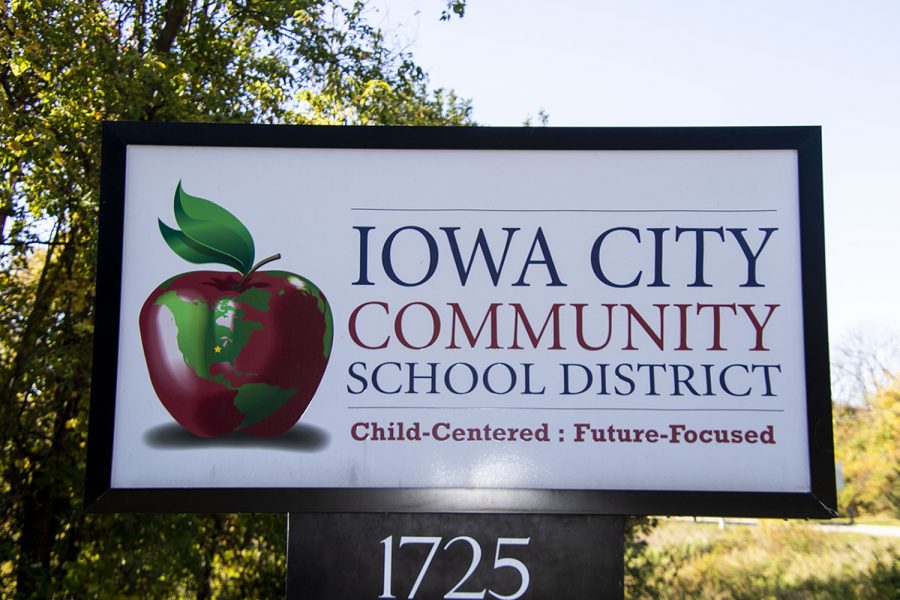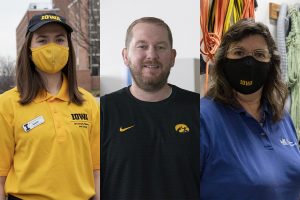Iowa City parents waiting for COVID-19 vaccine to be authorized for children
Although a COVID-19 vaccine is not yet authorized for children, Iowa City parents are thinking ahead to their children’s doses.
Iowa City Community School District sign 1725 North Dodge St. as seen on Thursday, Oct. 15, 2020.
March 23, 2021
When Iowa City parent Laura Crossett’s 9-year-old son found out the COVID-19 vaccine was being distributed to adults, he asked her to make sure he could get a vaccine as soon as possible.
“My son, like everyone, has been affected by COVID-19. You know, he doesn’t get to see his friends anymore for the most part, except online. His whole life was upended,” Crossett said. “He said to me the other night, ‘the coronavirus is what ruined everything.’”
Three COVID-19 vaccines have been emergency approved by the Food and Drug Administration for adults. The vaccine from Pfizer is authorized for people ages 16 and older, and the Moderna and single-dose Johnson & Johnson vaccines are authorized for people older than 18.
Moderna launched a vaccine trial for children ages 12 to 17 in December 2020, while Pfizer announced it has finished enrolling participants for its trial on children ages 12 to 15.
After undergoing a near-fatal experience with meningitis as an infant and listening to stories of her mother contracting polio and grandmother battling whooping cough and scarlet fever, Crossett said receiving vaccinations has always been essential for her family.
“I grew up hearing these stories, and when my son was born — at that time they go through all the vaccines with you — and they’re like, ‘Do you want the meningitis vaccine [for your son]?’ and I was like, ‘Absolutely yes,’” Crossett said. “There are all these illnesses that we don’t get anymore because there are vaccines.”
Clinical Associate Professor of Pediatrics and Infectious Diseases Melanie Wellington, who works at the University of Iowa Hospitals and Clinics, said she encourages parents to start thinking about their children receiving the COVID-19 vaccine in the future.
“If they’re sort of worried about it and they’re not sure where they’re going to stand on that decision, this would be a great time to start having a conversation with their pediatrician or primary care provider for their kids,” Wellington said.
Most skeptical parents are concerned at the speed at which experts developed the COVID-19 vaccine, Wellington said, but the technology is older than people may realize.
“Most of the leading vaccines out right now are either mRNA vaccines or adenoviral vector vaccines, and most people don’t know about them because the regular childhood immunizations don’t use those technologies,” Wellington said. “But it turns out, mRNA vaccines actually have been under study for quite a long time … and the first study being done with mRNA vaccines started in 1997. Adenoviral vector system has also been under study for a long time.”
Although clinical studies for the COVID-19 vaccine in adults and children are not as long as those for past vaccines, Wellington said the benefits of having a COVID-19 vaccine available to the public outweigh the risk of a shorter clinical study.
“I think a lot of people are like, ‘Wow, they just made this up, and they only have six months of data, and how could that possibly be safe?’ And the answer is that the system is established. What’s new is just the target,” Wellington said. “In both [mRNA and adenoviral vector] vaccines, what they eventually do is they tell your cell how to make that COVID-19 spike protein. Getting there is something new to most people, but it’s not new to science in the sense that we do have decades of experience with these things.”
Although some parents look forward to the day their child can receive a COVID-19 vaccination, others do not find it necessary. Terra Price, a mother to four children in Cedar County, said she does not plan on getting vaccinated for COVID-19, and does not intend for her children to be either. She’s among about 27 percent of Iowans who do not plan to get the vaccine, according to a March poll by the Des Moines Register.
Price said the only circumstance her children would receive the COVID-19 vaccine is if it becomes a required immunization for attending public school.
“My major concern would just be the age of the vaccine itself. It’s brand new. I mean, we’re talking about a virus that is essentially a year old,” Price said. “While I’m not going to say that the virus doesn’t exist, I don’t believe it deserves all of the hype that it gets.”
On the other hand, Iowa City parent Ulrike Carlson said that, if her children were willing, she’d be open to letting them participate in a pediatric vaccination trial.
“If my 14-year-old wanted to participate, we would look into it, certainly,” Carlson said. “I think it’s very important, and I think it’s important to be a citizen who would be willing to do something like that — because not everybody can, of course.”
Carlson said, though her children are looking forward to receiving a COVID-19 vaccination to regain more ordinary school and leisure routines, they do remain cautious.
“I think right now we’re still so unsure of when kids will be vaccinated at all. There hasn’t really been the sense of when it’s happening,” Carlson said. “Like everybody’s just kind of like ‘OK, this is the new normal,’ and so my kids are not daring to hope yet.”







